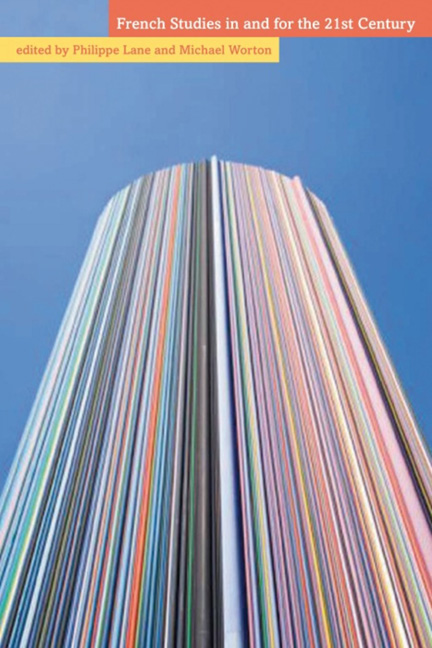Book contents
- Frontmatter
- Contents
- Notes on Contributors
- Foreword
- Foreword by His Excellency
- Part I: Contextualisations
- Part II: Research and Public Engagement Strategies
- Part III: The Place of Women and Gender in French Studies
- Part IV: The Place of Literature
- Part V: The Place of Linguistics in French Studies Today
- Part VI: Theatre, Cinema and Popular Culture
- Part VII: Area Studies, Postcolonial Studies and War and Culture Studies
- Part VIII: Adventures in Language Teaching
- 19 French Studies at the Open University: Pointers to the Future
- 20 Opportunities and Challenges of Technologically Enhanced Programmes: Online and Blended Learning at King's College London
- 21 French Studies and Employability at Home and Abroad: General Reflections on a Case Study
- 22 Sartre in Middlesex, De Beauvoir in Oxford: The Contribution of the ASMCF to the Study of France
- 23 Culturetheque: A New Tool for French Culture
- Appendices. Addresses to the Future of French Studies Conference
23 - Culturetheque: A New Tool for French Culture
from Part VIII: Adventures in Language Teaching
- Frontmatter
- Contents
- Notes on Contributors
- Foreword
- Foreword by His Excellency
- Part I: Contextualisations
- Part II: Research and Public Engagement Strategies
- Part III: The Place of Women and Gender in French Studies
- Part IV: The Place of Literature
- Part V: The Place of Linguistics in French Studies Today
- Part VI: Theatre, Cinema and Popular Culture
- Part VII: Area Studies, Postcolonial Studies and War and Culture Studies
- Part VIII: Adventures in Language Teaching
- 19 French Studies at the Open University: Pointers to the Future
- 20 Opportunities and Challenges of Technologically Enhanced Programmes: Online and Blended Learning at King's College London
- 21 French Studies and Employability at Home and Abroad: General Reflections on a Case Study
- 22 Sartre in Middlesex, De Beauvoir in Oxford: The Contribution of the ASMCF to the Study of France
- 23 Culturetheque: A New Tool for French Culture
- Appendices. Addresses to the Future of French Studies Conference
Summary
On 27 May 2010, the central project of the centenary celebrations of the Institut français du Royaume-Uni was unveiled: a digital platform called Culturetheque. The response of the French Institute in South Kensington, London to the new challenges posed by the digital revolution was to launch a new tool, which was unprecedented both in the UK and in France.
Culturetheque offers French culture at home, on the Internet, for free, in an accessible and user-friendly way: books to read online, films to watch online, podcasts of conferences and live retransmissions. Culturetheque is not a simple online platform to learn French, nor is it a research website; rather, it is a tool with French resources for anyone in the UK who is interested in French culture and would like to know more about French painters, authors, events, and so on. The content online is changed regularly, providing privileged access to a selection of carefully chosen content, with commentaries in English and a strong focus on everyday life, such as travel, cooking, fashion, or books.
The Genesis of ‘Your Digital Institute’
The project was initiated in January 2009 by the head of the Mediathèque. First of all, the 80,000 books in the Institut's beautiful wood-panelled library were being consulted less and less, notably by students who now chose to use the Internet rather than go into the library. Also, there has been a significant decline since 2004 in the number of young people taking GCSE French, diminishing from 300,000 to 170,000 in 2010; and only 13,850 students took A level French in June 2010, a decline of over 3 per cent compared to 2009.
The first aim of Culturetheque was therefore to attract a new public, one interested in French films and books, but who would not, or could not, travel to the French Institute or engage with any Alliance Française. Culturetheque aimed also to create a community of younger members who are used to accessing content on the Internet. Our goal was therefore to offer a wider range of exciting and entertaining cultural content to a broader range of users.
- Type
- Chapter
- Information
- French Studies in and for the 21st Century , pp. 288 - 290Publisher: Liverpool University PressPrint publication year: 2011



